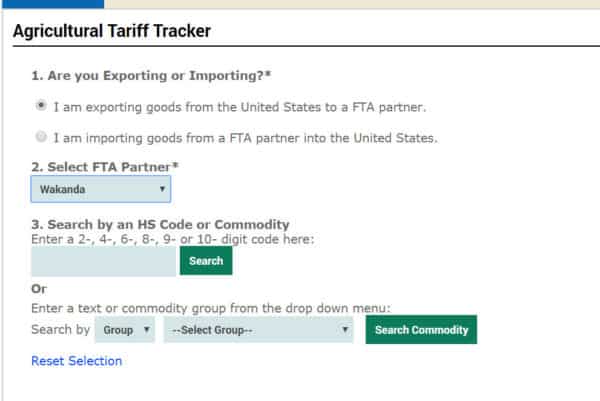Wakanda Nonsense is This? USDA Removes Fictional Marvel Comics Nation From Free Trade List
RT, December 19, 2019
The United States Department of Agriculture (USDA) has been left red-faced after one sleuth discovered the fictional nation of Wakanda in its online list of nations with whom the US has free trade agreements.
New York-based software engineer Francis Tseng first noticed Wakanda, of Marvel comics fame, on the US tariff list, complete with an excel spreadsheet showing individual tariff codes for various goods traded between the US including live animals including “live asses,” “mules and hinnies” as well as tobacco and alcohol.

Credit Image: Screenshot via RT
To add insult to injury, in yet another massive oversight, neither the heart-shaped herb which imbues Wakanda’s leaders with their extraordinary powers nor the fictional metal vibranium featured on the list, much to the dismay of many traders online.
“I was very confused at first and thought I misremembered the country from the movie and got it confused with something else,” Tseng said.
While on first glance it appears that USDA staff have yet to discover the magic and wonder of the fictional east-African nation in the Marvel cinematic universe, the agency claims the initial inclusion of the fictional nation was a “mistake” made as part of a test officials were running on the USDA’s Agricultural Tariff Tracker, a tool for tracking the cost of importing and exporting goods from countries with whom the US has free trade deals.
The Kingdom of Wakanda is the isolationist, ultra-advanced home of the Marvel superhero T’Challa aka Black Panther and was featured in the 2018 blockbuster bearing his name. To the disappointment of many online, it has since been removed from the USDA site.
Some online suggested it might be used as a means to commit trade fraud.
While others thought it a repeat of the Agrabah debacle in which, back in 2015, 30 percent of Republicans who participated in a Public Policy Poll said they were in favor of bombing Agrabah, the fictional nation from Disney’s Aladdin. Thankfully, 57 percent said they were “unsure.”















